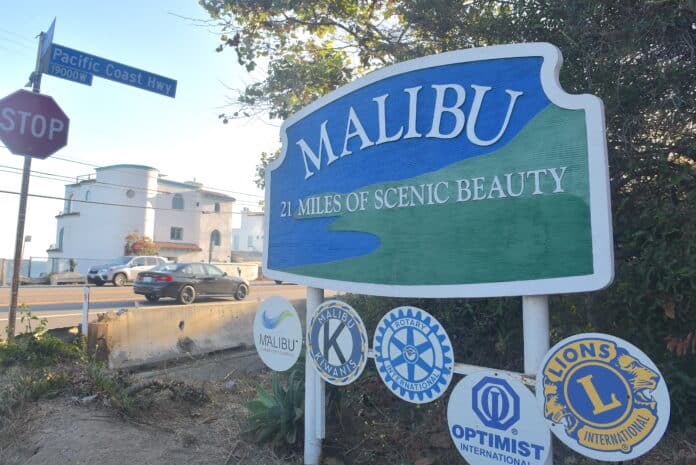
After the latest homeless fire on Jan. 21, updated ‘nuisance abatement’ procedures may be used for first time
Local residents are getting fed up with the number of wildfires started in homeless encampments in Tuna Canyon in eastern Malibu. The eastern Malibu area hasn’t burned in 30 years, and is now an especially high fire danger area. The encampments are widely considered to be a threat to residents’ safety.
The latest fire burned one acre near Tuna Canyon and Pacific Coast Highway on Jan. 21, with LA County Fire able to get it under control within 30 minutes.
During the Malibu homeless count on Jan. 25, local volunteers reported there were no longer any unhoused people camping out in Tuna Canyon, but tents and trash had been left behind.
The issue of repeated homeless fires at that location was discussed at the latest Public Safety Commission meeting on Feb. 1 by Public Safety Director Susan Duenas, as well as at the most recent City Council meeting.
In a phone interview, Duenas said the bottom line is that she and the city attorney are now in the process of trying to confirm who is legally responsible for cleaning up the homeless encampments in that area.
Canyon Vineyard Estates, LLC, has been the property owner since 2008, and Reid Breitman is the real estate developer behind the LLC. He bought the 12 parcels in lower Tuna Canyon through a foreclosure action against Mountains Restoration Trust (MRT).
The property, which consists of 417 acres of undeveloped land along the Pacific coast, is located both in the City of Malibu and unincorporated areas of LA County. It’s been mired in legal challenges for years.
John Paul DeJoria, self-made billionaire and philanthropist best known as a co-founder of the Paul Mitchell line of hair products and the Patrón Spirits Co., purchased Tuna Canyon in 1990. He intended to develop the property into a dozen 20-acre estates. However, after walking the land, DeJoria changed his mind and decided to donate Tuna Canyon to preserve it as open space.
In 2000, he approached MRT, a nonprofit land trust dedicated to preserving land in the Santa Monica Mountains, with a proposal to sell and gift Tuna Canyon to them. DeJoria and MRT executed a purchase agreement that required Tuna Canyon to “be held as open space in perpetuity and that no development of any kind shall take place on the property.”
DeJoria agreed to sell Tuna Canyon to MRT for $1.06 million and donate the remainder of the appraised value of $13 million as part of the purchase. He executed a grant deed conveying Tuna Canyon to MRT subject to covenants, conditions, restrictions, reservations, and easements of record.
MRT later defaulted on the loan they took out to purchase the property, and Canyon Vineyard Estates, LLC scooped up the property. In 2017, CVE began legal proceedings to extinguish the use restrictions contained in the grant deed, so they could develop it. For whatever reason, they continue to maintain that MRT is legally responsible for clearing the homeless encampments.
“We’re pursuing a summary abatement, which means an immediate abatement,” Duenas said. “Because there’s a question of who is responsible for doing the clean-up, the city attorney is reviewing the most recent court decision concerning CVE and its claims, which took place in November … I think that will be resolved this week.”
At the previous fire in Tuna Canyon, on July 9, 2021, which burned six acres, firefighters had to hike in at least 2,000 feet of hose to reach the burn zone and face the possibility of falling rocks. Fire Capt. Cole Kahle of Fire Station 88 said he witnessed the homeless pouring out of the area during that fire.
A number of CVE’s parcels in Tuna Canyon have been cited by LA County for failing to do brush clearance over a period of years. So, the owner is not only failing to keep trespassing campers off the land, they’re not even bothering with annual brush clearance. However, Duenas said CVE brought in security patrols for a time, but discontinued it.
In response to the 2021 fire, Malibu passed an expanded “Nuisance Abatement” ordinance that went into effect Aug. 20, 2021; giving private property owners a more detailed definition of what constitutes a nuisance. It now includes fire and biohazards; storage of cooking, heating and camping equipment; and trash and debris. In addition, nuisances were defined as conditions that threaten adjacent properties and the general community.
With the new “summary abatement” procedure, the city manager must first notify the owner of the hazardous conditions, and ask them to voluntarily take care of it. If they don’t, the city has the authority to enter the property, instigate abatement procedures, and bill the property owner for the clean-up.
